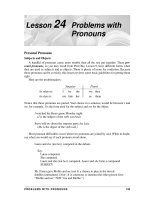Indefinite pronouns
Bạn đang xem bản rút gọn của tài liệu. Xem và tải ngay bản đầy đủ của tài liệu tại đây (15.02 KB, 1 trang )
Indefinite pronouns
Study the following sentences.
One hardly knows what to do.
One cannot choose one’s parents.
One must not boast of one’s success.
One should love one’s country.
None of them have come yet.
None but fools have ever believed it.
None of his books are best sellers.
Some are born great; some achieve greatness.
Nobody came to his rescue.
Somebody has let the cat in.
Few escaped unhurt.
What is everybody’s business is nobody’s business.
In the sentences given above the pronouns in bold text are examples of indefinite pronouns because they do
not refer to a particular person or thing. Indefinite pronouns are used to talk about people or things in a general
way.
Notes
Note that none is the shortened form of no one. In an informal style, none is commonly used with plural verbs.
Most indefinite pronouns can be used as adjectives.
Any fool can do that.
One day my prince will come.
He is man of few words.
Some milk was spilt.
To refer back to anybody, everybody, everyone, anyone, each etc., the pronoun he or she is used according to
the context.
Everyone of the boys has handed in his work.
Everyone of the girls has brought her violin.
Note that nowadays it is more common to use the plural pronoun they/them/their to refer back to everybody,
anybody etc.
Anybody can do it if they try.
Stay on top of your writing! Download our grammar guide from www.englishgrammar.org to stay up-to-date.
Powered by TCPDF (www.tcpdf.org)









